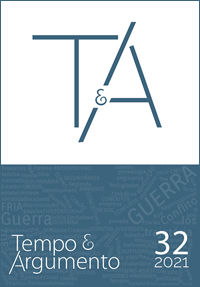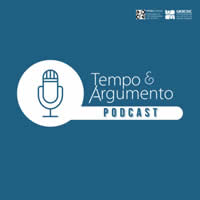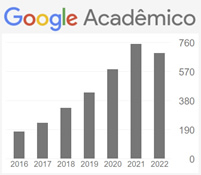Heritage and Identity: to Teach History with the Social Change
DOI:
https://doi.org/10.5965/2175180313322021e0208Abstract
Making history useful for students is one way of defining the main goal of teachers who need a general framework to act. To define the objectives is particularly important in the context of social changes. This general framework must be based on two levels: the cognitive, where teaching-learning of history is defined, and the social, where the consequences of the former, used at schools, influences the sense of usefulness. Between both, the role of heritage is pivotal. The rationale of the approach proposed in this paper can be explained through two main arguments: 1) Historical discipline is a scientific knowledge, although it is usually associated more to memorize than to reflect. In that sense, heritage can be treated as a historical source. Students can create multiple discourses if they have competences related to scientific, critical and creative thinking; 2) As history, heritage is a cornerstone in developing a sense of identity and should be used as such in schools to form citizens. With this in mind, three driving vectors are proposed where the usefulness of history depends on its treatment in schools: a) consumer collective identity/heritage-object/ insolvent historical knowledge; b) hard collective identity/heritage-commemoration/single history; and c) weak collective identity/heritage-resource/multiple history. The paper is concerned with the different possibilities adopted by teachers, considering that the current situation corresponds to the consumer collective identity and analyzing its consequences. Responding to this, we show two coherent alternatives to history teaching. Both are useful to education process, depending on our comprehension of what history is and what its usefulness means.
Downloads
References
ANGULO, Alfredo. Es que la historia ya no es como antes. DIKAIOSYNE, Mérida, v. 25, p. 163-176, 2010.
BARTON, Keith; LEVSTIK, LINDA. Teaching history for the common good. Oxford: Routledge, 2004.
BAUMAN, Zygmunt. Identidad. Madrid: Losada, 2003.
BRETON, Marie-Eve. Le patrimoine de proximité en contexte urbain comme nouvel espace d'identification collective: le cas de la Rue Saint-Malo à Brest. Université du Québec, 2011. Disponible en: http://www.archipel.uqam.ca/4103/1/M12059.pdf. Acceso en: 28 abr. 2021.
BURKE, Peter. New perspectives on historical writing. Cambridge : Polity Press, 1993.
CALAF, Roser. Didáctica del patrimonio: epistemología, metodología y estudio de casos. Gijón: Trea, 2009.
CARRETERO, Mario. Voces y ecos en los programas y textos escolares. In: CARRETERO, Mario (ed.). Documentos de identidad: la construcción de la memoria histórica en un mundo global. Buenos Aires: Paidós, 2007, p. 75-85.
CISCAR, Josep; SANTIAGO, José Antonio; SOUTO, Xosé María. Identidades nacionales y territorialidad en los libros de texto: los estereotipos enciclopédicos en la geografía escolar. Scripta Nova: Revista electrónica de geografía y ciencias sociales, Barcelona, v.16, n. 418, 2011. Disponible en: http://www.ub.edu/geocrit/sn/sn-418/sn-418-36.htm. Acceso en: 28 abr. 2021.
CONSEJO DE EUROPA. Quality history education in the 21st Century: principles and guidelines. Estrasburgo: Publications of Council of Europe, 2018.
CONWAY, Brian. Active remembering, selective forgetting, and collective identity: the case of Bloody Sunday. Identity: An International Journal of Theory and Research, [Filadelfia], v.3, n.4, p. 305-323, 2003. Disponible en: http://dx.doi.org/10.1207/S1532706XID0304_01. Acceso en: 28 abr. 2021.
CROUCH. David. Affect, heritage, feeling. In: WATERTON, Emma; WATSON, Steve (eds.). The palgrave handbook of contemporary heritage research. Nueva York: Palgrave MacMillan, 2015, p. 177-190.
CUENCA-LÓPEZ, José María; ESTEPA-GIMÉNEZ, Jesús; MARTÍN, Myriam. Patrimonio, educación, identidad y ciudadanía: profesorado y libros de texto en la enseñanza obligatoria. Revista de Educación, [Madrid], v. 375, p. 136-159, 2017.
EPSTEIN, Terrie. The effects of family/community and school discourses on children’s and adolescents’ interpretations of United States history. International Journal of Historical Learning, Teaching and Research, [s.l.], v.6, n.1, p. 1-9, 2007. Disponible en: http://dx.doi.org/10.18546/HERJ.06.0.04. Acceso en: 28 abr. 2021.
ERCIKAN, Kadriye; SEIXAS, Peter. New directions in assessing historical thinking. Londres: Routledge, 2015.
FONTAL, Olaia. La educación patrimonial: teoría y práctica en el aula, el museo e internet. Gijón: Trea, 2003.
GATTI, Gabriel. Algunas anécdotas y un par de ideas para escapar de las ficciones modernas acerca de la identidad colectiva. Berceo, Logroño, v, 153, p. 13-56, 2007. Disponible en: https://doi.org/10.4000/eces.379. Acceso en: 28 abr. 2021.
GÓMEZ-REDONDO, Carmen; FONTAL, Olaia; IBÁÑEZ-ETXEBERRIA, Alex. Procesos de patrimonialización e identización patrimonial con uso de TIC en torno al arte contemporáneo. Artnodes: Revista de arte, ciencia y tecnología, Barcelona, v. 17, p. 52- 63, 2016. Disponible en: https://doi.org/10.7238/a.v0i17.2827. Acceso en: 28 abr. 2021.
GONZÁLEZ, Neus. L’ús didàctic i el valor educatiu del patrimonio cultural. 2006. Tesis (Doctorado en Didáctica de las Ciencias Sociales) – Universitat Autònoma de Barcelona, Barcelona, 2006.
HUTCHINS, Rachel. Nationalism and history education: curricula and textbooks in the United States and France. Londres: Routledge, 2015.
INNERARITY, Daniel. The democracy of knowledge. Nueva York: Bloombury Academic, 2013.
JASPER, James; MCGARRY, Aidan. Introduction: the identity dilemma, social movements, and contested identity. In: MCGARRY, Aidan; JASPER; James (eds.). The identity dilemma: social movements and collective identity. Philadelphia: Temple University Press, 2015. p. 1-17.
JENKINS, Keith. Repensar la historia. Madrid: Siglo XXI, 2009.
JODELET, Denise. Representaciones sociales: contribución a un saber sociocultural. In: JODELET. Denise; GUERRERO, Alfredo (coord.). Desvelando la cultura: estudios en representaciones sociales. Ciudad de Mexico: UNAM-Facultad de Psicología, 2000. p. 7-30.
LÓPEZ, Humberto; RODRÍGUEZ, Cecilia. El debate sobre identidad individual e identidad colectiva. Aportes desde la psicología social. MILLCAYAC, Revista Digital de Ciencias Sociales, Mendoza, v.1, n.1, p. 99-107, 2014. Disponible en: http://revistas.uncu.edu.ar/ojs/index.php/millca-digital/article/view/218. Acceso en: 28 abr. 2021.
LOWENTHAL, David. El pasado es un país extraño. Madrid: Akal, 1998.
LUCAS, Laura; DELGADO-ALGARRA, Emilio José. El profesor posmoderno de ciencias sociales: un modelo de buenas prácticas en educación patrimonial. REICE. Revista Iberoamericana sobre Calidad, Eficacia y Cambio en Educación, Madrid, v. 18, n. 1, p. 27-45, 2019.
MACDONALD, Sharon. Museums, national, postnational and transcultural identities. Museums and society, Leicester, v.1, n.1, p. 1-16, 2003. Disponible en: https://journals.le.ac.uk/ojs1/index.php/mas/article/view/3/50. Acceso en: 28 abr. 2021.
MACMILLAN, Margaret. Juegos peligrosos: usos y abusos de la historia. Barcelona: Ariel, 2010.
MARCUS, Alan; STOODAR, Jeremy; WOODWAR, Walter. Teaching history with museums. Nueva York: Routledge, 2012.
MARTÍN, Myriam; CUENCA, José María. Educatio. Siglo XXI, Murcia, v.33, n.1, p. 33-54, 2015. Disponible en: http://dx.doi.org/10.6018/j/222491. Acceso en: 28 abr. 2021.
MERCADO, Asael; HERNÁNDEZ, Alejandrina. El proceso de construcción de la identidad colectiva. Convergencia, Revista de Ciencias Sociales, Toluca de Lerdo, v. 53, p. 229-251, 2010.
MOLINA, María Mercedes. Nuevos enfoques disciplinares en el patrimonio cultural. El peligro de la mercantilización patrimonial. Revista ph, Sevilla, v. 91, p. 138-139, 2017. Disponible en: http://dx.doi.org/10.33349/2017.0.3871. Acceso en: 28 abr. 2021.
MOLINA, Sebastián; MUÑOZ, Rafael Emilio. La opinión del profesorado de educación secundaria sobre el papel del patrimonio en la enseñanza formal de las ciencias sociales: un estudio de caso. Revista Complutense de Educación, Madrid, v. 27, n. 2, p. 863-880, 2016. https://doi.org/10.5209/rev_rced.2016.v27.n2.48411. Acceso en: 28 abr. 2021.
MORALES, Antonio José; CAURÍN, Carlos; SOUTO, Xosé Manuel. Percepción del mundo: mapas mentales y problemas socioambientales. Didáctica geográfica, Madrid, v. 14, p. 69-90, 2013.
ORGANIZACIÓN PARA LA COOPERACIÓN Y EL DESARROLLO ECONÓMICO (OCDE). Trends Shaping Education 2019. París: OECD Publishing, 2019.
PÉREZ GARZÓN, Juan Sisinio. Poderes y deberes para la enseñanza de las ciencias sociales. In: LÓPEZ FACAL; Ramón (ed.). Ciencias sociales, educación y futuro: investigaciones en didáctica de las ciencias sociales. Santiago de Composterla: Universidad de Santiago de Compostela, 2016. p. 62-69.
PINTO, Helena. Usos del patrimonio en la didáctica de la historia: perspectivas de los alumnos y profesores portugueses relativas a la identidad y conciencia histórica. Educatio Siglo XXI, Murcia, v. 31, n.1, p. 61-88, 2013.
PINTO, Helena. Educação histórica e patrimonial: concepções de alunos e profesores sobre o passado em espaços do presente. Oporto: CITCEM, 2016.
PLUCKROSE, Henry. Enseñanza y aprendizaje de la Historia. Madrid: Morata, 1993.
PONCE, Ana Isabel. Teorías epistemológicas y conocimiento histórico del alumnado: diseño y validación de una prueba (Tesis doctoral). Universidad de Murcia, Universidade do Porto, 2019.
RACHIK, Hassan. Identidad dura e identidad blanda. Revista CIDOB d’Afers Internacionals, Barcelona, v. 73-74, p. 9-20, 2006. Disponible en: https://doi.org/40378. Acceso en: 28 abr. 2021.
RIEFF, David. Contra la memoria. Barcelona: Debate, 2012.
RODRÍGUEZ, Milagros Elena. La educación patrimonial transcompleja que emerge del patrimonio cultural-identidad- y ciudadanía. Revista Educación y Humanismo, Barranquilla, v. 21, n. 36, p. 101-120, 2019. Disponible en: https://doi.org/10.17081/eduhum.21.36.3074. Acceso en: 28 abr. 2021.
RÜSEN, Jörn. History: narration, interpretation and orientation. Nueva York: Berghahn books, 2008.
SCHUGERENSKY, Daniel. Adult citizenship education: an overview of the field. In: FENWICK; Tara; NESBIT; Tom; SPENCER, Bruce (eds.). Contexts of adult education: canadian perspectives. Toronto: Thompson Educational Publishing Inc., 2006. p. 68-80.
SCHUGERENSKY, Daniel. Educación ciudadana e identidad: la disputa por la comunidad imaginada. In: LÓPEZ FACAL, Ramón (ed.). Ciencias Sociales, educación y futuro: investigaciones en didáctica de las ciencias sociales. Santiago de Compostela: Universidad de Santiago de Compostela, 2016. p. 48-61.
SEIXAS, Peter; MORTON, Tom. The big six historical thinking concepts. Toronto: Nelson Education, 2013.
SOLÉ, Gloria. Educação histórica e educação patrimonial: desafios da investigação em Portugal. In: MIRALLES, Pedro; GÓMEZ, Cosme; RODRÍGUEZ, Raimundo (eds.). La enseñanza de la historia en el siglo XXI: desarrollo y evaluación de competencias históricas para una ciudadanía democrática. Murcia: EDITUM, 2017. p. 145-166.
SUBERO, David; ESTEBAN-GUITART, Moisés. Más allá del aprendizaje escolar: el rol de la subjetividad en el enfoque de los fondos de identidad. Teri, Salamanca, v. 23, n.1, p. 213-236, 2020. Disponible en: http://dx.doi.org/10.14201/teri.20955. Acceso en: 28 abr. 2021.
TAROZZI, Massimiliano; TORRES, Carlos Alberto. Global citizenship education and the crises of multiculturalism: comparative perspectives. Nueva York: Bloomsbury Publishing, 2016.
VAN BOXTEL, Carla; GREVER, Maria; KLEIN, Stephan. Heritage as a resource for enhancing and assessing historical thinking: Reflections from the Netherlands. In: ERCIKAN, Kadriye; SEIXAS, Peter (Eds.). New directions in assessing historical thinking. Londres: Routledge, 2015. p. 40-50.
VANSLEDRIGHT, Bruce. Narratives of Nation-State, historical knowledge and school history education. Review of Research in Education, [s.l.], v. 32, p. 109-146, 2008. Disponible en: http://dx.doi.org/10.3102/0091732X07311065. Acceso en: 28 abr. 2021.
VANSLEDRIGHT, Bruce. Assessing historical thinking and understanding. Innovative designs for new standards. Londres: Routledge, 2014.
WATERTON, Emma; WATSON, Steve. Heritage as a focus of research: Past, present and new directions. In: WATERTON, Emma; WATSON, Steve (eds.). The Palgrave handbook of contemporary heritage research. Nueva York: Palgrave MacMillan, 2015. p. 1-20.
Downloads
Published
How to Cite
Issue
Section
License
Copyright (c) 2021 Tempo e Argumento

This work is licensed under a Creative Commons Attribution-NonCommercial 4.0 International License.
The articles published by the magazine are for free use, destined for educational purposes and not commercial. The copyrights are all granted to the magazine. The articles whose authors are identified represent the expressed opinion of its authors and not the official position of the Tempo e Argumento magazine or of the Postgraduate Program in History of the Universidade do Estado de Santa Catarina.




